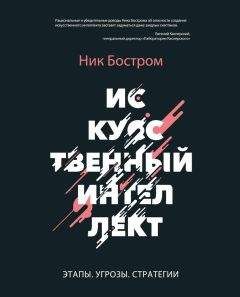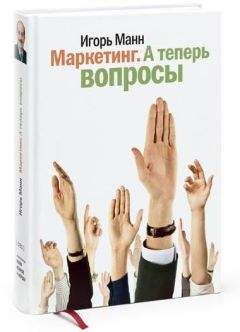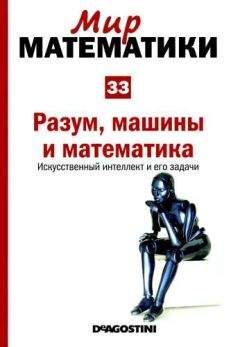Ник Бостром - Искусственный интеллект
На сайте mybooks.club вы можете бесплатно читать книги онлайн без регистрации, включая Ник Бостром - Искусственный интеллект. Жанр: Прочее издательство -,. Доступна полная версия книги с кратким содержанием для предварительного ознакомления, аннотацией (предисловием), рецензиями от других читателей и их экспертным мнением.
Кроме того, на сайте mybooks.club вы найдете множество новинок, которые стоит прочитать.

Ник Бостром - Искусственный интеллект краткое содержание
Искусственный интеллект читать онлайн бесплатно
Chalmers 2010 — Chalmers David John. The Singularity: A Philosophical Analysis // Journal of Consciousness Studies, 2010, 17 (9–10), p. 7–65.
Chason et al. 2011 — Chason R. J., Csokmay J., Segars J. H., DeCherney A. H., Armant D. R. Environmental and Epigenetic Effects Upon Preimplantation Embryo Metabolism and Development // Trends in Endocrinology and Metabolism, 2011, 22 (10), p. 412–420.
Chen, Ravallion 2010 — Chen S., Ravallion M. The Developing World Is Poorer Than We Thought, But No Less Successful in the Fight Against Poverty // Quarterly Journal of Economics, 2010, 125 (4), p. 1577–1625.
Chislenko 1996 — Chislenko Alexander. Networking in the Mind Age: Some Thoughts on Evolution of Robotics and Distributed Systems, 1996 (Unpublished manuscript).
Chislenko 1997 — Chislenko Alexander. Technology as Extension of Human Functional Architecture, 1997 (Extropy Online).
Chorost 2005 — Chorost Michael. Rebuilt: How Becoming Part Computer Made Me More Human. Boston: Houghton Mifflin, 2005.
Christiano 2012 — Christiano Paul F. «Indirect Normativity» Write-up // Ordinary Ideas (blog), 2012, April 21.
CIA, 2013 — The World Factbook. Central Intelligence Agency, 2013 (https://www.cia.gov/library/publications/the-world-factbook/rankorder/2127rank.html?countryname=United States&countrycode=us®ionCode=noa&rank=121#us).
Cicero. On Divination — Cicero Marcus Tullius. On Divination // Cicero: On Old Age, On Friendship, On Divination (Loeb Classical Library, No. 154) / Transl. W. A. Falconer. Cambridge, MA: Harvard University Press, 1923.
Cirasella, Kopec 2006 — Cirasella Jill, Kopec Danny. The History of Computer Games // Exhibit at Dartmouth Artificial Intelligence Conference: The Next Fifty Years ( [email protected]). Dartmouth College, 2006, July 13–15.
Ćirković 2004 — Ćirković Milan M. Forecast for the Next Eon: Applied Cosmology and the Long-Term Fate of Intelligent Beings // Foundations of Physics, 2004, 34 (2), p. 239–261.
Ćirković et al. 2010 — Ćirković Milan M., Sandberg Anders, Bostrom Nick. Anthropic Shadow: Observation Selection Effects and Human Extinction Risks // Risk Analysis, 2010, 30 (10), p. 1495–1506.
Clark, Chalmers 1998 — Clark Andy, Chalmers David J. The Extended Mind // Analysis, 1998, 58 (1), p. 7–19.
Clark 2007 — Clark Gregory. A Farewell to Alms: A Brief Economic History of the World. 1st ed. Princeton, NJ: Princeton University Press, 2007.
Clavin 2012 — Clavin Whitney. Study Shows Our Galaxy Has at Least 100 Billion Planets // Jet Propulsion Laboratory, 2012, January 11.
CME Group 2010 — What Happened on May 6th? Chicago: CME Group, 2010, May 10.
Coase 1937 — Coase R. H. The Nature of the Firm // Economica, 1937, 4 (16), p. 386–405.
Cochran, Harpending 2009 — Cochran Gregory, Harpending Henry. The 10,000 Year Explosion: How Civilization Accelerated Human Evolution. New York: Basic Books, 2009.
Cochran et al. 2006 — Cochran G., Hardy J., Harpending H. Natural History of Ashkenazi Intelligence // Journal of Biosocial Science, 2006, 38 (5), p. 659–693.
Cook 1984 — Cook James Gordon. Handbook of Textile Fibres: Natural Fibres. Cambridge: Woodhead, 1984.
Cope 1996 — Cope David. Experiments in Musical Intelligence. Computer Music and Digital Audio Series. Madison, WI: A-R Editions, 1996.
Cotman, Berchtold 2002 — Cotman Carl W., Berchtold Nicole C. Exercise: A Behavioral Intervention to Enhance Brain Health and Plasticity // Trends in Neurosciences, 2002, 25 (6), p. 295–301.
Cowan 2001 — Cowan Nelson. The Magical Number 4 in Short-Term Memory: A Reconsideration of Mental Storage Capacity // Behavioral and Brain Sciences, 2001, 24 (1), p. 87–114.
Crabtree 1999 — Crabtree Steve. New Poll Gauges Americans’ General Knowledge Levels // Gallup News, 1999, July 6.
Cross, Walker 1994 — Cross Stephen E., Walker Edward. Dart: Applying Knowledge Based Planning and Scheduling to Crisis Action Planning // Intelligent Scheduling / Eds. Monte Zweben, Mark Fox. San Francisco, CA: Morgan Kaufmann, 1994, p. 711–729.
Crow 2000 — Crow James F. The Origins, Patterns and Implications of Human Spontaneous Mutation // Nature Reviews Genetics, 2000, 1 (1), p. 40–47.
Cyranoski 2013 — Cyranoski David. Stem Cells: Egg Engineers // Nature, 2013, 500 (7463), p. 392–394.
Dagnelie 2012 — Dagnelie Gislin. Retinal Implants: Emergence of a Multidisciplinary Field // Current Opinion in Neurology, 2012, 25 (1), p. 67–75.
Dai 2009 — Dai Wei. Towards a New Decision Theory // Less Wrong (blog), 2009, August 13.
Dalrymple 2011 — Dalrymple David. Comment on Kaufman J. «Whole Brain Emulation: Looking at Progress on C. Elegans» // Less Wrong (blog), 2011, October 29.
Davies et al. 2011 — Davies G., Tenesa A., Payton A., Yang J., Harris S. E., Liewald D., Ke X. Genome-Wide Association Studies Establish That Human Intelligence Is Highly Heritable and Polygenic // Molecular Psychiatry, 2011, 16 (10), p. 996–1005.
Davis et al. 2010 — Davis Oliver S. P., Butcher Lee M., Docherty Sophia J., Meaburn Emma L., Curtis Charles J. C., Simpson Michael A., Schalkwyk Leonard C., Plomin Robert. A Three-Stage Genome-Wide Association Study of General Cognitive Ability: Hunting the Small Effects // Behavior Genetics, 2010, 40 (6), p. 759–767.
Dawkins 1995 — Dawkins Richard. River Out of Eden: A Darwinian View of Life. Science Masters Series. New York: Basic Books, 1995.
De Blanc 2011 — De Blanc Peter. Ontological Crises in Artificial Agents’ Value Systems. Machine Intelligence Research Institute, San Francisco, CA, 2011, May 19.
De Long 1998 — De Long J. Bradford. Estimates of World GDP, One Million B.C. — Present, 1998 (Unpublished manuscript).
Dean 2005 — Dean Cornelia. Scientific Savvy? In U.S., Not Much // New York Times, 2005, August 30.
Deary 2001 — Deary Ian J. Human Intelligence Differences: A Recent History // Trends in Cognitive Sciences, 2001, 5 (3), p. 127–130.
Deary 2012 — Deary Ian J. Intelligence // Annual Review of Psychology, 2012, 63, p. 453–482.
Degnan et al. 2002 — Degnan G. G., Wind T. C., Jones E. V., Edlich R. F. Functional Electrical Stimulation in Tetraplegic Patients to Restore Hand Function // Journal of Long-Term Effects of Medical Implants, 2002, 12 (3), p. 175–188.
Devlin et al. 1997 — Devlin B., Daniels M., Roeder K. The Heritability of IQ // Nature, 1997, 388 (6641), p. 468–471.
Dewey 2011 — Dewey Daniel. Learning What to Value // Artificial General Intelligence: 4th International Conference, AGI 2011, Mountain View, CA, USA, August 3–6, 2011. Proceedings / Eds. Jürgen Schmidhuber, Kristinn R. Thórisson, Moshe Looks. Lecture Notes in Computer Science 6830. Berlin: Springer, 2011, p. 309–314.
Dowe and Hernandez-Orallo 2012 — Dowe D. L., Hernandez-Orallo J. IQ Tests Are Not for Machines, Yet // Intelligence, 2012, 40 (2), p. 77–81.
Drescher 2006 — Drescher Gary L. Good and Real: Demystifying Paradoxes from Physics to Ethics. Bradford Books. Cambridge, MA: MIT Press, 2006.
Drexler 1986 — Drexler K. Eric. Engines of Creation. Garden City, NY: Anchor, 1986.
Drexler 1992 — Drexler K. Eric. Nanosystems: Molecular Machinery, Manufacturing, and Computation. New York: Wiley, 1992.
Drexler 2013 — Drexler K. Eric. Radical Abundance: How a Revolution in Nanotechnology Will Change Civilization. New York: PublicAffairs, 2013.
Driscoll 2012 — Driscoll Kevin. Code Critique: «Altair Music of a Sort» // Paper presented at Critical Code Studies Working Group Online Conference, 2012, February 6.
Dyson 1960 — Dyson Freeman J. Search for Artificial Stellar Sources of Infrared Radiation // Science, 1960, 131 (3414), p. 1667–1668.
Dyson 1979 — Dyson Freeman J. Disturbing the Universe. 1st ed. Sloan Foundation Science Series. New York: Harper & Row, 1979.
Elga 2004 — Elga Adam. Defeating Dr. Evil with Self-Locating Belief // Philosophy and Phenomenological Research, 2004, 69 (2), p. 383–396.
Elga 2007 — Elga Adam. Reflection and Disagreement // Nous, 2007, 41 (3), p. 478–502.
Eliasmith et al. 2012 — Eliasmith Chris, Stewart Terrence C., Choo Xuan, Bekolay Trevor, DeWolf Travis, Tang Yichuan, Rasmussen Daniel. A Large-Scale Model of the Functioning Brain // Science, 2012, 338 (6111), p. 1202–1205.
Ellis 1999 — Ellis J. H. The History of Non-Secret Encryption // Cryptologia, 1999, 23 (3), p. 267–273.
Elyasaf et al. 2011 — Elyasaf Achiya, Hauptmann Ami, Sipper Moche. Ga-Freecell: Evolving Solvers for the Game of Freecell // Proceedings of the 13th Annual Genetic and Evolutionary Computation Conference, 1931–1938. GECCO’ 11. New York: ACM, 2011.
Eppig et al. 2010 — Eppig C., Fincher C. L., Thornhill R. Parasite Prevalence and the Worldwide Distribution of Cognitive Ability // Proceedings of the Royal Society B: Biological Sciences, 2010, 277 (1701), p. 3801–3808.
Espenshade et al. 2003 — Espenshade T. J., Guzman J. C., Westoff C. F. The Surprising Global Variation in Replacement Fertility // Population Research and Policy Review, 2003, 22 (5–6), p. 575–583.
Evans 1964 — Evans Thomas G. A Heuristic Program to Solve Geometric-Analogy Problems // Proceedings of the April 21–23, 1964, Spring Joint Computer Conference. AFIPS ’64. New York: ACM, 1964, p. 327–338.
Evans 1968 — Evans Thomas G. A Program for the Solution of a Class of Geometric-Analogy Intelligence-Test Questions // In Semantic Information Processing / Ed. Marvin Minsky. Cambridge, MA: MIT Press, 1968, p. 271–353.
Faisal et al. 2008 — Faisal A. A., Selen L. P., Wolpert D. M. Noise in the Nervous System // Nature Reviews Neuroscience, 2008, 9 (4), p. 292–303.
Faisal et al. 2005 — Faisal A. A., White J. A., Laughlin S. B. Ion-Channel Noise Places Limits on the Miniaturization of the Brain’s Wiring // Current Biology, 2005, 15 (12), p. 1143–1149.
Feldman 2000 — Feldman Jacob. Minimization of Boolean Complexity in Human Concept Learning // Nature, 2000, 407 (6804), p. 630–633.
Feldman, Ballard 1982 — Feldman J. A., Ballard Dana H. Connectionist Models and Their Properties // Cognitive Science, 1982, 6 (3), p. 205–254.
Foley et al. 2007 — Foley J. A., Monfreda C., Ramankutty N., Zaks D. Our Share of the Planetary Pie // Proceedings of the National Academy of Sciences of the United States of America, 2007, 104 (31), p. 12585–12586.
Forgas et al. 2010 — The Psychology of Attitudes and Attitude Change (Sydney Symposium of Social Psychology) // Eds. Joseph P. Forgas, Joel Cooper, William D. Crano. New York: Psychology Press, 2010.
Frank 1999 — Frank Robert H. Luxury Fever: Why Money Fails to Satisfy in an Era of Excess. New York: Free Press, 1999.
Fredriksen 2012 — Fredriksen Kaja Bonesmo. Less Income Inequality and More Growth — Are They Compatible? Part 6: The Distribution of Wealth. Technical report, OECD Economics Department Working Papers 929. OECD Publishing, 2012.
Freitas 1980 — Freitas Robert A., Jr. A Self-Replicating Interstellar Probe // Journal of the British Interplanetary Society, 1980, 33, p. 251–264.
Freitas 2000 — Freitas Robert A., Jr. Some Limits to Global Ecophagy by Biovorous Nanoreplicators, with Public Policy Recommendations // Foresight Institute, 2000, April (Retrieved 2013, July 28; http://www.foresight.org/nano/Ecophagy.html).
Freitas, Merkle 2004 — Freitas Robert A., Jr., Merkle Ralph C. Kinematic Self-Replicating Machines. Georgetown, TX: Landes Bioscience, 2004.
Gaddis 1982 — Gaddis John Lewis. Strategies of Containment: A Critical Appraisal of Postwar American National Security Policy. New York: Oxford University Press, 1982.
Gammoned.net, 2012 — Snowie // Gammoned.net. (Archived version. Retrieved 2012, June 30; http://web.archive.org/web/20070920191840/http://www.gammoned.com/snowie.html).
Gates 1975 — Gates Bill. Software Contest Winners Announced // Computer Notes, 1975, 1 (2), p. 1.
Georgieff 2007 — Georgieff Michael K. Nutrition and the Developing Brain: Nutrient Priorities and Measurement // American Journal of Clinical Nutrition, 2007, 85 (2), p. 614S–620S.
Gianaroli 2000 — Gianaroli Luca. Preimplantation Genetic Diagnosis: Polar Body and Embryo Biopsy // Supplement, Human Reproduction, 2000, 15 (4), p. 69–75.
Gilovich et al. 2002 — Heuristics and Biases: The Psychology of Intuitive Judgment / Eds. Thomas Gilovich, Dale Griffin, Daniel Kahneman. New York: Cambridge University Press, 2002.
Gilster 2012 — Gilster Paul. ESO: Habitable Red Dwarf Planets Abundant // Centauri Dreams (blog), 2012, March 29.
Goldstone 1980 — Goldstone Jack A. Theories of Revolution: The Third Generation // World Politics, 1980, 32 (3), p. 425–453.
Goldstone 2001 — Goldstone Jack A. Towards a Fourth Generation of Revolutionary Theory // Annual Review of Political Science, 2001, 4, p. 139–187.
Good 1965 — Good Irving John. Speculations Concerning the First Ultraintelligent Machine // Advances in Computers / Eds. Franz L. Alt, Morris Rubinoff. New York: Academic Press, 1965, 6, p. 31–88.
Good 1970 — Good Irving John. Some Future Social Repercussions of Computers // International Journal of Environmental Studies, 1970, 1 (1–4), p. 67–79.
Good 1976 — Good Irving John. Book review of «The Thinking Computer: Mind Inside Matter» // International Journal of Man-Machine Studies, 1976, 8, p. 617–620.
Good 1982 — Good Irving John. Ethical Machines // Intelligent Systems: Practice and Perspective / Eds. J. E. Hayes, Donald Michie, Y.-H. Pao. Machine Intelligence 10. Chichester: Ellis Horwood, 1982, p. 555–560.
Похожие книги на "Искусственный интеллект", Ник Бостром
Ник Бостром читать все книги автора по порядку
Ник Бостром - все книги автора в одном месте читать по порядку полные версии на сайте онлайн библиотеки mybooks.club.




